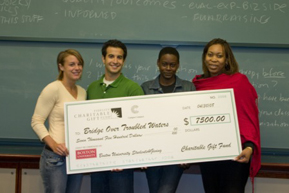Student Philanthropists Give Cash Boost to Worthy Causes
SMG nonprofit class selects two groups for $15,000 donation

For Morena Zelaya, the idea that she, a college senior, might call herself a philanthropist was a revelation.
“My perception of philanthropy was mostly one that featured older crowds — I had an image in my head of an old married couple giving donations to museums and theaters,” says Zelaya (CAS’08). “This experience showed me that philanthropy does not have an age restriction. Anybody can be involved in it.”
This past semester, Zelaya and her classmates in the School of Management’s Nonprofit Management course gave away $15,000 to two worthy groups — Year Up Boston, which trains young urban adults for the workforce and for higher education, and Bridge Over Troubled Waters, which helps Boston’s at-risk, homeless, and runaway youth.
Fidelity Investments donated the $15,000 to the University as part of a national pilot program to nurture young philanthropists on college campuses. The charitable initiative, called Students4Giving, is a joint effort of Campus Compact, a national coalition of college and university presidents dedicated to civic and community engagement on campus, and the Fidelity Charitable Gift Fund, the charitable arm of Fidelity Investments and the country’s fourth-largest public charity. BU was one of five institutions nationwide selected to receive the funds.
Kristen McCormack, faculty director of SMG’s Public and Nonprofit Management Program, says taking philanthropic concepts out of the classroom and into the street proved invaluable.
“The students really got involved and took their charge very seriously,” she says. “After a painstaking process of evaluation and debate, not to mention budget exercises, outcomes assessment, and sustainability analysis, any of these students could go to work for a nonprofit organization tomorrow.”
Over the course of the semester, McCormack helped the class morph into an authentic charitable organization — the students formed a board of directors, created donor guidelines, and researched the inner workings of potential candidates. The selection process was rigorous: invitation-only RFP (request for proposal) and review, numerous site visits and interviews, and a series of class presentations. The students considered more than 50 nonprofit organizations, scrutinizing a range of things from missions and fiscal health to management style and sustainability. In the end, the class agreed to split the $15,000 between Year Up Boston and Bridge Over Troubled Waters, both urban, youth-oriented groups.
“The people who can speak government business and social enterprise — those crossovers will be the leaders of the 21st century,” says Gerald Chertavian, CEO of Year Up. “The nonprofit industry is moving towards a higher level of engagement in the donation process. This grant is a good example of that trend.”
Shavata Gupta (SMG’08) says the class made her realize that philanthropy isn’t just about writing a big check. “It involves identifying a problem, meeting a need — whether it be social or economic — providing assistance, fundraising, creating a budget, and more,” she says. “It’s about much more than giving. It changes lives.”
Caleb Daniloff can be reached at cdanilof@bu.edu.
Comments & Discussion
Boston University moderates comments to facilitate an informed, substantive, civil conversation. Abusive, profane, self-promotional, misleading, incoherent or off-topic comments will be rejected. Moderators are staffed during regular business hours (EST) and can only accept comments written in English. Statistics or facts must include a citation or a link to the citation.